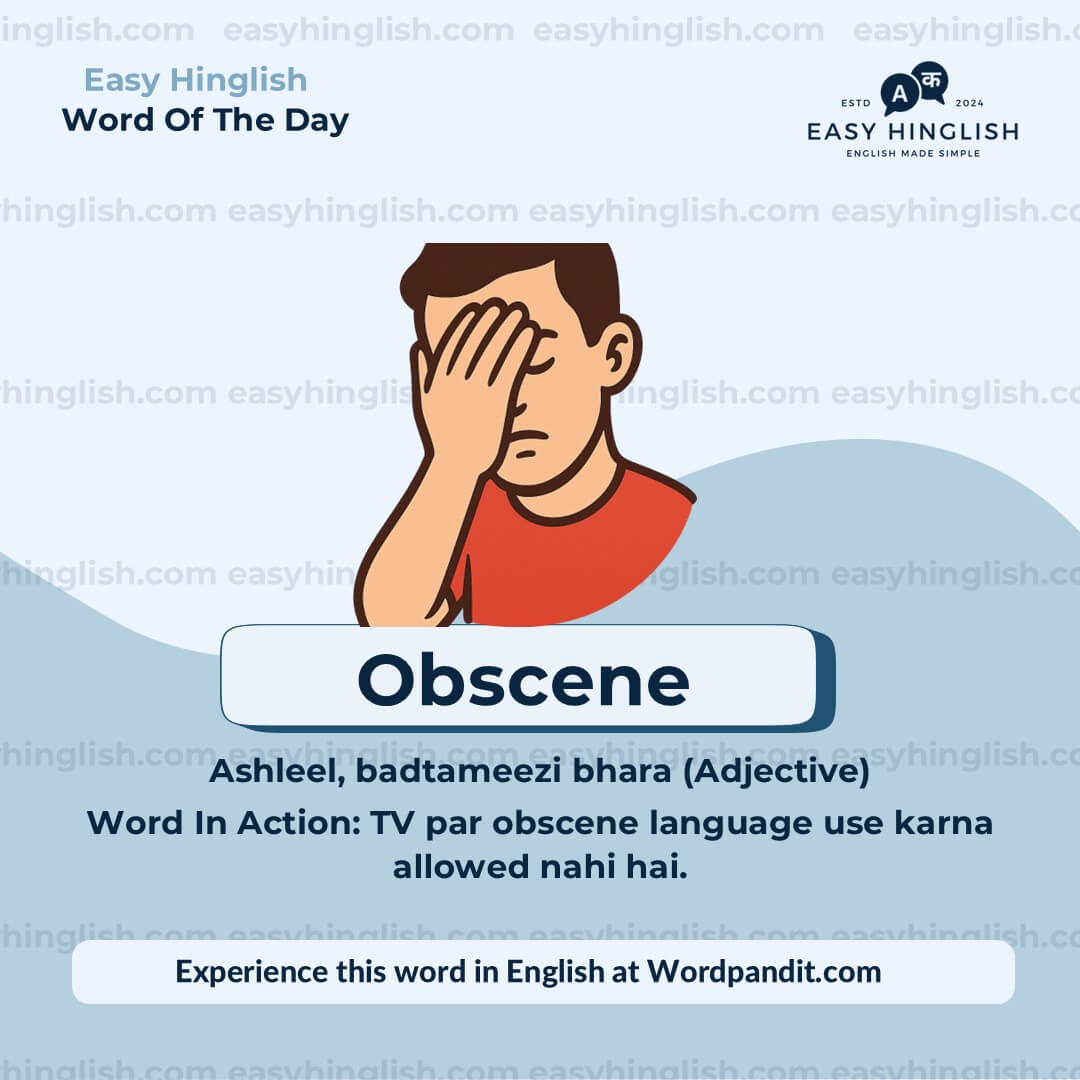Daily Vocabulary Indian Newspapers aur Publications se Seekho
Welcome to Wordpandit ka Indian Vocabulary Hub
Wordpandit par, hum samajhte hain ki ek achhi vocabulary develop karne ke liye local context samajhna bhi zaroori hai. Is section ka focus hai aapke vocabulary ko India ke leading newspapers aur publications se naye shabdon aur phrases ke zariye improve karna, taaki aap practical, relevant, aur uniquely Indian words seekh sakein.
Indian Sources Itne Important Kyun Hain?
Hum maante hain ki kisi bhi language ko sikhne ka sabse best tareeka hai uske local content me immerse hona. Isi wajah se hum carefully words curate karte hain top Indian newspapers aur publications se, jaise:
- The Hindu
- The Times of India
- The Economic Times
- Hindustan Times
- Live Mint
- The Indian Express
- Aur bhi bahut saare...
Hamesha Updated Raho, Hamesha Relevant Raho
Daily updates ke saath, aap Indian news sources se naye words seekhoge jo Indian society aur culture ke latest trends ko reflect karte hain. Hamara focus hai aise words provide karna jo aapke liye real-world me useful ho.
Wordpandit Aapke Learning Goals Ko Kaise Support Karta Hai?
Chahe aap exams ki preparation kar rahe ho, professional communication improve karna chahte ho, ya sirf naye words seekhna chahte ho, Wordpandit har step par aapki madad karega.
Practical Tareeke Se Seekho
Hamari interactive learning methodology me real-world examples, engaging activities, aur context-based usage shamil hain, taaki har naya shabd aapki active vocabulary ka hissa ban sake.
Aaj Hi Indian Vocabulary Seekhna Shuru Karo!
Wordpandit Kyun Choose Karein?
Practical Learning: Aise words seekho jo aapko real-world reading aur communication me sach me kaam aayenge, taaki aapki comprehension aur bolne ki skills improve ho.
Diverse Content: Current affairs se lekar scientific breakthroughs tak, hamare different sources aapko multiple domains ka vocabulary sikhate hain.
Effortless Integration: Wordpandit ko apni daily routine ka part banao. Sirf kuch minute har din dene se aapki vocabulary time ke saath kaafi improve ho sakti hai.
Aapka Vocabulary Mastery Tak Ka Safar
- Regularly hamare Daily Vocabulary section ko visit karo
- Naye words explore karo aur unka context me use samjho
- In words ko apni writing aur bolne ki practice me use karne ki koshish karo
- Jaise-jaise aapke words badhte hain, apni progress ko track karo
Aaj Se Apni Vocabulary Journey Shuru Karo!
Wordpandit ke saath vocabulary improve karna start karo. Roz thoda effort dalne se aap ek strong vocabulary develop kar sakte ho jo academic, professional, aur personal life me kaafi kaam aayegi.
Yaad rakho, ek naya shabd roz seekhna linguistic limitations ko door karne ka best tareeka hai! Wordpandit ko apni daily learning journey ka sathi banao aur vocabulary excellence ki taraf badho!
WORD-1: Commuters
Sandarbh (Context):
"Another issue that has been a frequent hindrance to commuters and pedestrians is several cars and buses parked in a row on both narrow and broad lanes, some in unexpected spaces." - The Hindu
Vyakhya (Explanatory Paragraph):
"Commuters" un logon ko bola jaata hai jo har roz ghar se office ya school jaate hain aur wapas aate hain. Inka routine travel hota hai, isliye inhe rozana ke traffic, parking ki dikkat aur public transport ki samasya ka samna karna padta hai. Upar ke context mein bhi yeh dikh raha hai ki parking ki dikkat in logon ke liye ek badi samasya ban chuki hai.
Arth (Meaning): Roz travel karne wale log, jaise office ya school ke liye (Noun)
Uccharan (Pronunciation): kuh-MYOO-terz
Kathinai Star (Difficulty Level): ⭐⭐ Basic
Utpatti (Etymology): Latin shabd "commutare" se aaya hai, jiska matlab hota hai "badalna ya exchange karna". Aage chal kar iska matlab ban gaya—roz ka safar karne wale log.
Prashant Sir Ke Tathya (Prashant Sir's Notes):
"Commute" ka matlab hota hai travel karna, aur "commuters" woh log hote hain jo ye kaam har din karte hain. Ye word aksar traffic reports, transport planning aur urban discussions mein use hota hai.
Samanarthi & Vipritarthi (Synonyms & Antonyms):
Samanarthi (Synonyms): travelers, passengers, riders, daily travelers
Vipritarthi (Antonyms): residents, homebodies, locals (context ke hisaab se)
Udaharan (Usage Examples):
- Roz hazaron commuters metro ka use karte hain traffic se bachne ke liye.
- Subah ke waqt fog ki wajah se commuters ko delay ka samna karna pada.
Sanskritik Sandarbh (Cultural Reference):
"Aaj ka commuter life fast-paced aur stressful ban chuki hai—bheed, rush aur time ka pressure." - Urban Studies Journal
Sochiye (Think About It):
Kya roz ka commuting ek aadmi ki mental health ya productivity ko affect karta hai?
Chhoti Kriya (Quick Activity):
Apne sheher ke ek commuter ka routine likhiye. Isme 'congestion', 'schedule', aur 'mode of transport' ka use karein.
Yaad Karne Ka Tarika (Memory Tip):
Sochiye: "Commute = Come + Route" — woh log jo daily ek hi route follow karte hain work/school ke liye.
Vastavik Jeevan Me Upyog (Real-World Application):
"Commuters" ka use aksar news, government policies aur transport systems ke discussions mein hota hai—especially jab baat traffic, roads ya public transport ki hoti hai.
WORD-2: Anonymous
Sandarbh (Context):
"On the other hand, a travel company owner who preferred to stay anonymous said that parking has become an issue for them too, forcing them to park at public spaces." - The Hindu
Vyakhya (Explanatory Paragraph):
"Anonymous" ka matlab hota hai koi aisi vyakti jiska naam pata na ho ya jise jaan bujhkar chhupaya gaya ho. Jaise upar ke example mein travel company ke owner ne apna naam nahi bataya—shayad privacy ya professional reason ki wajah se. Journalism, online comments, ya secret reports mein yeh word kaafi commonly use hota hai.
Arth (Meaning): Naam se pehchaan na hona, ya naam chhupaya gaya ho (Adjective)
Uccharan (Pronunciation): uh-NON-uh-mus
Kathinai Star (Difficulty Level): ⭐⭐ Basic
Utpatti (Etymology): Greek shabd "anōnumos" se, jiska matlab hota hai "bina naam ke" (an = bina + onyma = naam)
Prashant Sir Ke Tathya (Prashant Sir's Notes):
Dhyan dein: "An-" ka matlab hota hai bina aur "onym" ka matlab hai naam. Ye word news reports aur internet pe kaafi use hota hai—jab kisi ka naam nahi bataya jaata, jaise whistleblowers, secret donors, ya comment posters ke case mein.
Samanarthi & Vipritarthi (Synonyms & Antonyms):
Samanarthi (Synonyms): unnamed, unidentified, unknown, incognito, secret
Vipritarthi (Antonyms): named, identified, known, recognized
Udaharan (Usage Examples):
- Donor ne media se bachne ke liye apna naam anonymous rakha.
- Police ko anonymous caller ne incident ki jankari di.
Sanskritik Sandarbh (Cultural Reference):
"Anonymous" ek digital activist group ka bhi naam hai jo Guy Fawkes mask pehenta hai aur cyber protests karta hai. - Global Tech Culture
Sochiye (Think About It):
Kya internet par anonymous rehna freedom protect karta hai, ya logon ko irresponsible banata hai?
Chhoti Kriya (Quick Activity):
Teen aise situations likhiye jahan log anonymous rehna chahenge. Har ek mein reason batayein.
Yaad Karne Ka Tarika (Memory Tip):
Sochiye: "A No Name = Anonymous" — jab kisi ka naam na diya gaya ho.
Vastavik Jeevan Me Upyog (Real-World Application):
"Anonymous" word ka use journalism, surveys, cyber security, aur literature mein hota hai. Jab kisi ki identity chhupani hoti hai ya usse protect karna hota hai, tab yeh word important ho jaata hai.
WORD-3: Obscene
Sandarbh (Context):
"Priyank Kanoongo, member of the National Human Rights Commission (NHRC), in a letter written to YouTube has directed the social media platform to take down the ‘obscene and vulgar’ video of podcaster Ranveer Allahbadia from the show ‘India’s Got Latent’." - The Hindu
Vyakhya (Explanatory Paragraph):
"Obscene" ka matlab hota hai koi cheez jo samajik maryada ke hisaab se offensive ya be-hadd ashleel ho—khaaskar jab baat sexual content, gandi bhasha, ya inappropriate behavior ki ho. Upar wale example mein ek public official ne YouTube se aisi video ko hataane ko kaha hai jo society ke norms ke khilaaf maani gayi.
Arth (Meaning): Bahut jyada ashleel ya samajik roop se apriy (Adjective)
Uccharan (Pronunciation): ub-SEEN
Kathinai Star (Difficulty Level): ⭐⭐⭐ Intermediate
Utpatti (Etymology): Latin word “obscenus” se aaya hai, jiska matlab hota hai “foul ya indecent”—ye word pehle theatre ya speeches mein use hota tha un cheezon ke liye jo display ke layak nahi hoti thi.
Prashant Sir Ke Tathya (Prashant Sir's Notes):
"Obscene" ek aisa shabd hai jiska use media, kanoon aur culture mein kaafi serious context mein hota hai. Ye sirf rude nahi, balki extreme level ka indecent content ko describe karta hai. Isse vaakya mein "obscene language," "obscene gesture" jaise phrases ke saath commonly use kiya jata hai.
Samanarthi & Vipritarthi (Synonyms & Antonyms):
Samanarthi (Synonyms): indecent, vulgar, lewd, offensive, crude
Vipritarthi (Antonyms): decent, modest, appropriate, respectable
Udaharan (Usage Examples):
- Us comedian par obscene language use karne ke liye fine lagaya gaya.
- Logon ne ek billboard ke khilaaf protest kiya kyunki wo obscene aur public ke liye inappropriate tha.
Sanskritik Sandarbh (Cultural Reference):
America ke ek famous case *Miller v. California (1973)* ne ye decide kiya ki kya cheez "obscene" maani jaayegi. Ye word censorship laws aur media guidelines mein central hai. - U.S. Legal Archives
Sochiye (Think About It):
Freedom of expression aur obscene content ke beech boundary kahaan honi chahiye?
Chhoti Kriya (Quick Activity):
Teen jagah likhiye (jaise school, cinema, office) jahan obscene content sabse zyada problem create kar sakta hai. Har case mein bataiye kyun.
Yaad Karne Ka Tarika (Memory Tip):
Sochiye: "Obscene = Obvious + Scene" — ek aisi scene jo itni obvious aur offensive ho ki sab ko shock kare.
Vastavik Jeevan Me Upyog (Real-World Application):
"Obscene" ka use laws, education, media aur workplace guidelines mein hota hai. Ye define karta hai ki kya cheez public display ke layak hai aur kya censorship ya penalty deserve karti hai.
WORD-4: Intolerance
Sandarbh (Context):
"The NHRC member claimed that the complaint highlights concerns regarding the show’s propagation of negativity, discriminatory perspectives, religious and cultural intolerance, and disrespectful and obscene ideologies, particularly towards women and children." - The Hindu
Vyakhya (Explanatory Paragraph):
"Intolerance" ka matlab hota hai doosre logon ke vichaar, dharm, ya culture ko accept na karne ki soch. Jab koi sirf apni belief ko sahi samajhta hai aur doosron ko galat ya apmaanit karta hai, toh usse intolerance kehte hain. Upar wale context mein show par yeh aarop hai ki woh religious aur cultural intolerance ko badhava de raha hai, jo ek diverse samajh ke liye harmful ho sakta hai.
Arth (Meaning): Doosre vicharon, beliefs ya behavior ko bardasht na kar pana (Noun)
Uccharan (Pronunciation): in-TOL-uh-runss
Kathinai Star (Difficulty Level): ⭐⭐⭐ Intermediate
Utpatti (Etymology): Latin shabd "intolerantia" se, jiska matlab hota hai "na bardasht karne layak"; isme "in-" (nahi) aur "tolerantia" (sahan karne ki shamta) shamil hai.
Prashant Sir Ke Tathya (Prashant Sir's Notes):
"Tolerance" ka matlab hai acceptance. Jab iske aage "in-" lagta hai to uska arth ulta ho jaata hai—yaani "acceptance na hona". Intolerance sirf personal nahi, balki samajik level par bhi problems create karta hai. Is shabd ka use political, religious aur social discussions mein aksar hota hai.
Samanarthi & Vipritarthi (Synonyms & Antonyms):
Samanarthi (Synonyms): prejudice, bigotry, narrow-mindedness, discrimination, bias
Vipritarthi (Antonyms): acceptance, open-mindedness, tolerance, inclusiveness, respect
Udaharan (Usage Examples):
- Desh ne religious intolerance ko rokne ke liye kanooni kadam uthaye hain.
- Agar hum doosre opinions ko tolerate nahi karte, toh democracy ki strength kam ho jaati hai.
Sanskritik Sandarbh (Cultural Reference):
India har saal 16 November ko "Tolerance Day" manata hai, jiska uddeshya hota hai shanti aur cultural respect promote karna—aur intolerance ke khatre ko samajhna. - UNESCO
Sochiye (Think About It):
Kya sirf kanoon intolerance ko khatam kar sakta hai, ya logon ki soch aur education bhi zaroori hai?
Chhoti Kriya (Quick Activity):
Ek aisa example likhiye—personal ya historical—jahan intolerance dekhne ko mila ho. Usse door karne ka ek solution bhi batayein.
Yaad Karne Ka Tarika (Memory Tip):
"In-" (not) + "Tolerance" (acceptance) = Not accepting. Intolerance matlab: doosron ko bardasht na kar paana.
Vastavik Jeevan Me Upyog (Real-World Application):
"Intolerance" ka use diversity, social justice aur human rights ke discussions mein hota hai. Education policies, speeches aur anti-discrimination laws mein yeh word important role play karta hai.
WORD-5: Disseminates
Sandarbh (Context):
"It is further alleged that, under the guise of freedom of speech, the show disseminates obscene and vulgar content along with misleading messages, thereby fostering a corrupt mindset in society." - The Hindu
Vyakhya (Explanatory Paragraph):
"Disseminates" ka matlab hota hai kisi jaankari, idea, ya content ko bade scale par logon tak pahunchaana. Jaise upar wale sentence mein kaha gaya hai ki ek show freedom of speech ke naam par vulgar aur misleading content ko logon tak faila raha hai. Is word ka use tab hota hai jab kisi cheez ko intentionally aur widespread tareeke se share kiya jaata hai.
Arth (Meaning): Kisi soch, jaankari ya content ko logon tak failaana (Verb)
Uccharan (Pronunciation): dih-SEM-uh-nayts
Kathinai Star (Difficulty Level): ⭐⭐⭐ Intermediate
Utpatti (Etymology): Latin shabd "disseminare" se aaya hai—"dis-" (door-door) + "seminare" (beej bona). Yaani jaise khet mein beej bonte hain, waise hi soch ya content ko samajh mein failana.
Prashant Sir Ke Tathya (Prashant Sir's Notes):
Sochiye jaise ek kisan beej bon raha ho—"disseminating" matlab aise hi knowledge ya information ko spread karna. Yeh word media, education, aur legal context mein commonly use hota hai. Jab propaganda ya awareness ki baat hoti hai tab is word ka special use dekha jaata hai.
Samanarthi & Vipritarthi (Synonyms & Antonyms):
Samanarthi (Synonyms): spread, broadcast, circulate, propagate, publicize
Vipritarthi (Antonyms): suppress, conceal, withhold, hide, contain
Udaharan (Usage Examples):
- University apni research findings ko journals ke zariye regularly disseminate karti hai.
- Social media par galat afwayein tezi se disseminate ho gayi.
Sanskritik Sandarbh (Cultural Reference):
Printing press ne human history ko badal diya, kyunki usne knowledge dissemination ko tezi se possible banaya—jiska result tha Enlightenment aur modern education. - History of Communication, Oxford University
Sochiye (Think About It):
Aaj ke digital zamaane mein jab har cheez easily disseminate ho jaati hai, kya misinformation se bachna mushkil ho gaya hai?
Chhoti Kriya (Quick Activity):
Ek current event choose kariye aur likhiye: ek sentence jisme responsible dissemination hua ho, aur ek jisme misuse ya misinformation spread hui ho.
Yaad Karne Ka Tarika (Memory Tip):
Sochiye: “Disseminate = Distribute like seeds.” Jaise kisan beej failata hai, waise hi log ideas aur information ko society mein failate hain.
Vastavik Jeevan Me Upyog (Real-World Application):
"Disseminates" ka use journalism, education, health communication, aur government policies mein hota hai—jab baat hoti hai information ya message ko public tak pohochane ki.













